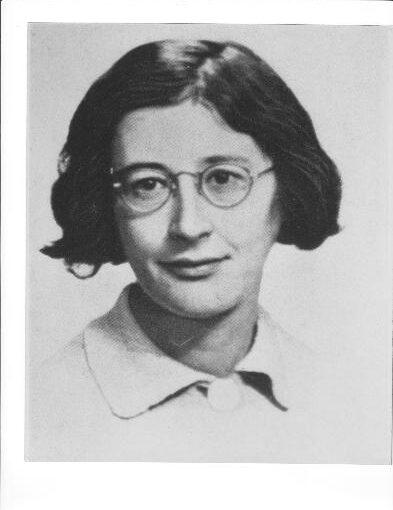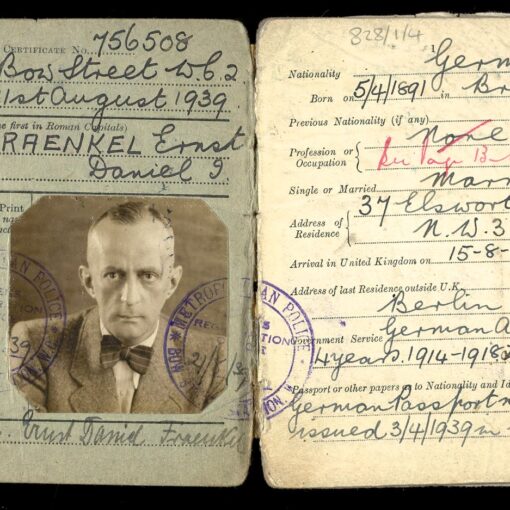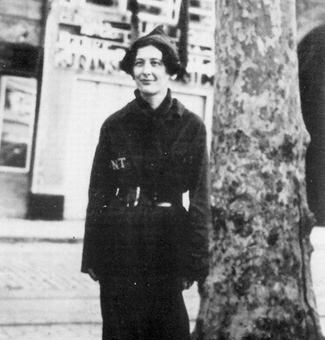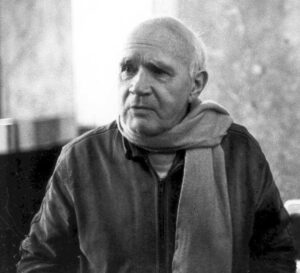
By Benjamin P. Davis
What I will always remember about the end of our seminar is the moment when several students, as they packed up their notes and put on their jackets, also chose to put on their keffiyehs. This was five days after the start of the first Israel-Hamas temporary cease fire (broken at the time of this writing) and four days after three Palestinian students were shot near the University of Vermont while two of the students were wearing keffiyehs.
By wearing the traditional Palestinian symbol after our seminar, students placed themselves at risk to receive murderous violence. It is difficult for any professor to encourage such an action, because the worst that could happen—and lately this is a fear I hold daily (and hold heavy)—is the loss of a student. But by wearing keffiyehs together, we also make each other safer. Every time we speak, write, or dress as a group, we also make it harder for all of us to be targeted. That is precisely the point of (and the logic of care behind) collective action.
In our seminar Bernard spoke about Simone Weil’s “immersive philosophical praxis,” meaning how she placed herself alongside those she was struggling with. And Frieda mentioned the French playwright Jean Genet, known for his time in prison, his Breton-striped style, and his commitment that love was not what powerful people said it was.
Genet, as it happens, also had a history at Columbia.
In an essay on Genet published in Grand Street, Edward Said tells the story of leaving Hamilton Hall to see Genet speak (on the steps of the Low Library) at a rally for the Black Panthers in the spring of 1970, with the university having yet to recover from the student protests of 1968. Said noted about Columbia that at that time “its administration was feeling uncertain, its faculty were badly divided, its students were perpetually exercised both in and out of the classroom.”[1]
At the Panther rally, Said observed a great difference between “the declarative simplicity of Genet’s French remarks” and “the immensely baroque embellishment of them by my erstwhile student.” He explains:
Genet would say, for example, “The blacks are the most oppressed class in the United States.” This would emerge in the translator’s colorful ornamentation as something like “In this motherfucking son-of-a-bitch country, in which reactionary capitalism oppresses and fucks over all the people, not just some of them…”
Said adds that when he next saw Genet, in Beirut in the fall of 1972, “it seemed appropriate to tell Genet my spectator’s side of the Panther rally and get his reaction to his interpreter’s embellishments. He seemed unfazed: ‘I may not have said all those things,’ he said, ‘but,’ he added solemnly, ‘je les pensais.’”
***
That essay on Genet was important enough to Said that he saved the published article, which is now collected in Said’s archive at the Butler Library.
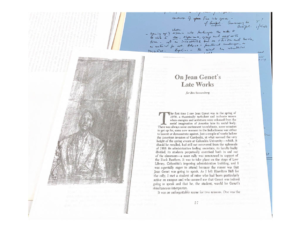
In that moment in the Greene Annex, I was struck by the fact that it was not just Palestinians who were wearing keffiyehs. Instead, people from various ancestries—representing what Said called our “intertwined histories”[2]—chose to take on the Palestinian symbol. The seemingly small gesture of wearing a scarf cut across racial lines. It hinted at the potential for belonging to be understood not just as national, as something we are born into, but as political, as something we achieve by acting together over time.
And this act—not merely a political one, but perhaps even more so one of bearing witness—offered a response to a question I have been thinking about for a long time: How can we question the personal borders we often assume and thus leave unacknowledged, unexamined, and so unchanged?
Since I first read Frieda’s unforgettable book on Genet, Race and Sex Across the French Atlantic, I have been thinking about her insight that “race was invented as a category at the same time that categorical reason was invented as an all-important theoretical tool,” so arguably “[o]ne should also extend [a critique of racial categories] to the entire process of categorical reason.”[3]
I have to admit that I have never really known what this would look like, to critique (and subsume) the process of categorical reason. In my usual, limited fashion as a philosopher, I have been thinking about her line mostly on the level of concepts, as if reason were not lived out on our bodies. But the keffiyehs made me wonder if such a line might be truly answered in practice. (Weil again: “Philosophy [including problems of cognition, etc.] is exclusively an affair of action and practice.”[4])
Maybe wearing keffiyehs together is what it looks like, right now, to think not just critically of race, but also to think against categorical reason—to think (or to be), as Said put it, from a place of exile, which he repeatedly insisted was an option even for those not undergoing physical exile. He said in his Reith Lectures, later collected as Representations of the Intellectual:
Exile is a model for the intellectual who is tempted, and even beset and overwhelmed, by the rewards of accommodation, yea-saying, settling in. Even if one is not an actual immigrant or expatriate, it is still possible to think as one, to imagine and investigate in spite of barriers, and always to move away from the centralizing authorities towards the margins, where you see things that are usually lost on minds that have never traveled beyond the conventional and the comfortable.[5]
What Genet and Weil share is an almost passé understanding that solidarity is about personal risk, exemplified in actions we might describe as downwardly mobile (“away from”). Yet what Said personally troubles about such an understanding is that sometimes one becomes the voice for a people, or the first of one’s kind in a space where rights are granted or denied, and that that positioning (as voice, as first) requires adapting to the norms of the space in order to secure needed rights. Weil might counter (not in theory—she was not one to publish about herself—but in practice) that before, during, and after her time as the only woman in her class at the École normale supérieure, she never chose to represent herself in a way that could secure her position, only to think more and more from the standpoint of those her state had dispossessed. (Said might remind us that Weil had a state to rail against in the first place.)
***
With respect to his own late style, in his last major lecture, “Memory, Inequality, and Power: Palestine and the Universality of Human Rights,” Said emphasized the role of the university. In the Q&A to that lecture, he said:
It is the special role of universities… [to be] places for the open and free discussion of ideas, where controversy ought not to be shied away from. I think it is a good thing to debate matters in a polarized and polemical way so long as it is still within the community of learning and investigation.[6]
Such a university would not just provide a community of learning and investigation, but it would also actually attend to what each student is going through, because we would acknowledge (instead of avoid) the forceful reality that surrounds us.
Currently many universities’ mental health emails in effect gaslight students, because the emails come after policies that prevent student groups from speaking up for human rights, itself a part of full psychological life.
These emails are just one part of how universities make claims to social justice while in practice denying such justice through their actions, such as developing real estate at the cost of breaking apart local communities or keeping endowment investments in fossil fuels and weapons. A cooperative alternative, a truer university community, could be built by chipping away at such “walls of denial,”[7] as Said put it elsewhere.
But if students are not given the opportunity to discuss and disagree, or allowed to write and march, then few spheres of agency and voice remain. (Such as the clothes we wear.)
***
On the plane home from New York, I was reflecting on Said’s point—or how I read his point—in a 2000 interview that took place a few minutes from our 29 November seminar. In that interview he offers a connection between belonging to a position of exile and singing a song of love. Drifting away from the question he was asked, Said cites a book he has been reading:
There is a wonderful book by a Hispanist at Yale called Rosa Menocal called The Shards of Love, and it’s a study of the lyric. And she argues that the lyric, as well as the rise of philology, are based upon exile; that you only write about things in a lyrical way if there is a sense of distance and loss and dispossession.[8]
But, he goes on to note, historically the academy has excluded the lyrics of those exiles, “the people who have used words where geography was cruel.”
If we cancel student organizations, planned events, or multifaith vigils—or if we are afraid to teach and write ourselves—then through this other form of denial, we do not even allow our students to use words, to sing their songs. Instead, we model a politics of fear. We avoid the shared struggle of care and cooperation.
But some still sing anyway.
And that is the immersive witness of wearing a keffiyeh in this moment: that at the risk of future employment and present life, this choice, usually understood as ideological or nationalist, is perhaps better understood as an imperfect attempt (like all human attempts) to love across the motherfucking, son-of-a-bitch categories we have inherited, to learn through the profound, uprooting losses we must still remember together.
Dedication and Acknowledgments
For Steve Tamari. In appreciation of Chris Tinson. And in memory of Jacques Coursil, who said, “You don’t make music by listening to music. You must listen to the world.”
Regarding precedent for the claim that wearing keffiyehs cuts against nationalism, cf. Fanon’s line in Wretched “We Algerians.” Cf. also the street protest chant “We Are All Palestinians.” Cf. also Ayça Çubukçu on state repression in “We Are All Criminals,” Jadaliyya, https://www.jadaliyya.com/Details/44109. See also Bernard Harcourt, The Counterrevolution: How Our Government Went to War Against Its Own Citizens.
Notes
[1] For all quotations about Genet at Columbia, see Edward Said, On Late Style, pp. 73-90.
[2] For this phrase, see the introduction to Culture and Imperialism.
[3] Frieda Ekotto, Race and Sex across the French Atlantic, p. 38.
[4] Simone Weil, First and Last Notebooks, p. 362.
[5] Edward Said, Representations of the Intellectual, p. 63.
[6] See Edward Said, “Memory, Inequality, and Power: Palestine and the Universality of Human Rights” (around 1:37), https://www.youtube.com/watch?v=Pb2pYStv8x8&ab_channel=UCBerkeleyEvents.
[7] Edward Said, Culture and Imperialism, p. 41.
[8] Cindi Katz and Neil Smith, “An interview with Edward Said,” p. 642, https://journals.sagepub.com/doi/10.1068/d2106i.


